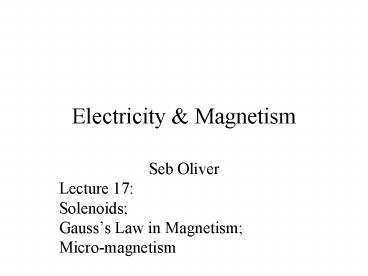Electricity PowerPoint PPT Presentation
1 / 23
Title: Electricity
1
Electricity Magnetism
- Seb Oliver
- Lecture 17
- Solenoids
- Gausss Law in Magnetism
- Micro-magnetism
2
Summary Lecture 16
- Amperes Law
- Easier to use than Biot-Savart Law in many cases
- Examples
- Long-wire
- Inside wire
- Toroid
- Solenoid
3
Today
- Solenoid
- Gausss Law in Magnetism
- Microscopic description of magentism
4
Solenoid
5
Infinitely Long Solenoid
Wire carrying a current of I0 wrapped around with
n coils per unit length
Zoom looks very similar to the toroid with a very
large radius
6
Toroidal Coil Revisited
I0
Toroid has N loops of wire, carrying a current I0
Central radius R circumference is 2pR
Number of coils per unit length n is
From earlier
Independent of R
7
Infinitely Long Solenoid
Wire carrying a current of I0 wrapped around with
n coils per unit length
Field at centre is same as torus of infinite
radius
8
Magnetic Field Lines
- Field lines between adjacent wires cancel
- Field lines down axis of solenoid reinforce each
other - Field lines outside solenoid cancel
9
Magnetic field from a solenoid
Similar to a bar magnet
Weak Field off-axis
Strong Field along axis
10
Gausss Law in Magnetism
11
Gausss Law in Magnetism
- Magnetic Flux
- Gausss Law
- Magnetic Monopoles
12
Electric Flux
- Magnetic flux is defined similarly to electric
flux
Electric flux
If E to A
If E not to A
In vector notation
13
Magnetic Flux
Magnetic flux
If B to A
If B not to A
In vector notation
Flux proportional to number of Field lines
Magnetic Flux
14
Gausss Law in Electrostatics
Charge contained within the surface
Total Flux through a surface
15
Gausss Law in Magnetism
Total Flux through a surface
Gausss Law
- All fields lines must pass in and out of a
surface - No Magnetic monopoles
16
Microscopic Magnetism
17
Generation of Magnetic Fields
- Magnetic Field produced by current loop
- Torque on current loop in magnetic field
18
Magnetic Field from Current Loop
at centre
19
Force on Current Carrying Loop
F 0
L
L
F -ILB
L
F ILB
B
L
F 0
Total Force is zero
However Torque is not zero
20
Torque on Current Carrying Loop
However Torque is not zero
B
L
L
L
Since LB perpendicular L
L
Where we have defined a magnetic moment m IA
21
Two Current Loops
Loop 2 feels a torque which is acting to turn the
loop so that the magnetic moments align
Loop 1 has a magnetic moment which produces a
magnetic field
22
Many loops Magnetic Moments
Before
After
23
Many loop Magnetic Field
Before
After
Little or no nett magnetic field
Stronger Magnetic Field
24
Microscopic Description of Magnetism Magnetic
moment of electron
Bohr model of the atom
Electron whizzing around nucleus
path
current
speed
Magnetic moment
Period
25
Angular Momentum
Electrons are usually described in terms of
angular momentum
Angular momentum (L mvr) is the angular
equivalent of linear momentum (p mv)
Angular momentum is conserved (unless a torque is
acting) thus a ballerina goes faster if she pulls
her arms in
Magnetic moment is proportional to spin
26
Microscopic Description of Magnetism
- Magnetic moment of an atom is related to spin of
the electrons - A net magnetic moment can be produced in
materials where the net spin is non-zero - Magnetic moments of lots of atoms will tend to
line up - Producing a Macroscopic Magnetic Field
27
Magnetic Materials
Magnetic Moment per unit volume
- Paramagnetic
- M ? applied magnetic field B
- Ferromagnetic
- m align even in a weak magnetic field
- Strong magnetic materials
- Diamagnetic
- No permanent m
- M ? -B
28
Diamagnetic Materials
2 electrons spinning in opposite directions L-,
L
Applying a magnetic field produces a force on the
electrons F v ? B
B
This cannot change the speed, but can change the
radius of the orbit
This in turn affects the angular momentum
r decreases
r increases
L decreases
L increases
L increases
m decreases
m decreases
m increases
29
Summary Lecture 17
- Solenoid
- Field lines around a solenoid
- strong inside, weak outside
- Gausss Law in Magnetism (not covered Aut. 2002)
- All flux lines entering a surface leave it
- No magnetic monopoles
- Microscopic description of magnetism
- Electrons orbiting nuclei in atoms act like
charge loops producing small magnetic fields - These fields can align either spontaneously
(Ferromagnetism) or in the presence of an
external magnetic field (Paramagnetism)

